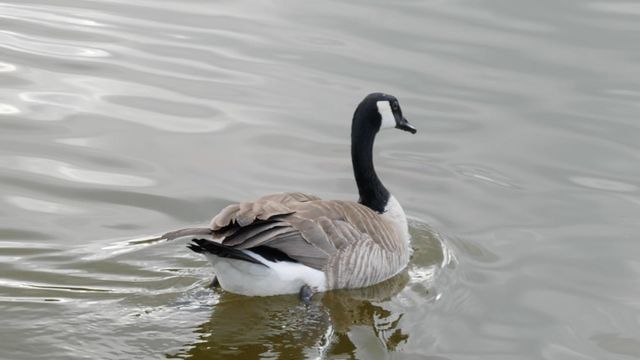NC wildlife expert: Everything to know about Canada geese
Some people see Canada geese as a nuisance. Falyn Owens, a biologist with the North Carolina Wildlife Resources Commission, answered your most popular questions, explaining how to avoid them and what to do if you find one on your path.
Q: Is it Canada geese or Canadian geese?
The correct term is Canada geese.
Q: Canada geese can be annoying. Are they actually a problem?
"It depends," Owens explained, depending on how you feel about Canada geese and how many are in your neighborhood. Geese are more of a problem in some areas than others.
"I'd say we have what we call robust populations of Canada geese in North Carolina," Owens said.
Geese are native to North Carolina and this is their home too, but in areas where a prime habitat is supplied for them, geese can increase in numbers to the point where they can become a nuisance, whether it be from excess waste, feeding on grass or aggressive behavior.
Q: How can you keep Canada geese away?
Want to discourage geese from taking over your neighborhood?
According to Owens, how humans manage their landscape is a big factor.
1. Create a barrier between water and grass
Canada geese thrive in open, grassy lawns and fields right next to retention ponds, lakes or other bodies of water. Geese especially like mowed grass, which is why they are commonly seen in neighborhoods and parks.
"A mowed lawn next to a body of water is their absolute favorite thing," Owens said.
To discourage Canada geese, humans need to break the connection between the water geese use for safety and the grass they use for food.

People can build a short fence, at least 2 feet tall, around bodies of water to prevent geese from walking directly from the water to the grass. A less expensive, easier alternative is planting native landscaping, like wildflowers, around the pond to form a natural barrier between grass and water.
2. Don't feed the geese
Feeding ducks and geese will pretty much guarantee that Canada geese will stick around and even multiply.
3. Alternative options
There are even private businesses that specialize in removing geese from communities once they become a problem. These experts have a variety of techniques, Owens said, like using dogs to scare geese away. Some professionals even use remote-controlled toy boats to repeatedly follow geese in ponds, eventually encouraging the geese to move on.
The goal is never to harm the geese but to annoy them so they move to another spot.
Q: Are there any benefits to Canada geese?
Canada geese are native to North Carolina and a valuable food source for native predators like foxes and coyotes. During hunting season, Canada geese in North Carolina can also be hunted as waterfowl, and Owens said many people enjoy the taste of Canada geese meat.
Q: Can Canada geese attack you?
A healthy adult doesn't have anything to fear from a Canada goose, Owens explained, and it is very unlikely that a human would be attacked or injured. Owens said the rare, worst-case scenario, a bite, would feel like being pinched, and it wouldn't draw blood or cause significant injury.
As a general rule, Canada geese will walk or fly away if you get close to them, Owens said. However, if you see a single goose standing its ground, use caution and give it a wide berth. In the springtime, when geese are nesting, a male goose or gander standing alert may be protecting his hen and her nest or babies.
"They can be pretty scary when they don't want to be messed with ... they're very good at asserting themselves," said Owens, adding, whenever someone encounters an aggressive goose, "almost 100% of the time it is a male goose defending his hen" who has a nest nearby.
In this case, the gander’s intent is to intimidate, not to injure, according to Owens.











